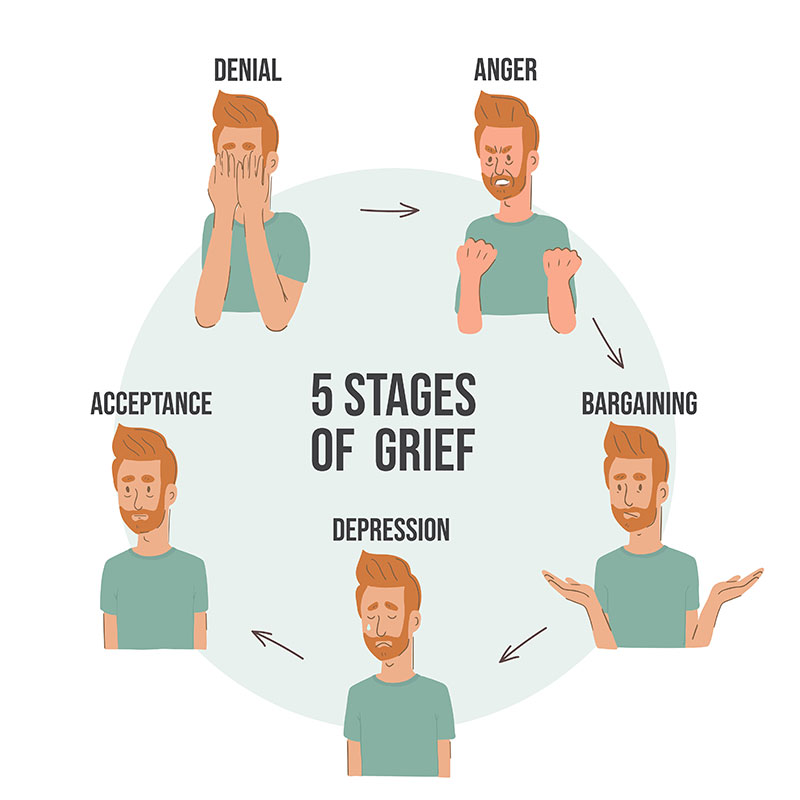Fort Collins Grief Counseling
Grief can result from various types of loss, such as the death of a loved one, divorce, job loss, or major life changes.
Here’s why addressing grief is important:
Emotional Well-being:
Grief can manifest as intense emotions like sadness, anger, guilt, and confusion. Failing to address these emotions can lead to prolonged suffering, emotional distress, and even mental health issues, such as depression and anxiety.
Physical Health:
Grief can have physical effects, including sleep disturbances, appetite changes, and a weakened immune system. Unresolved grief may contribute to physical ailments and an increased vulnerability to illness.
Interpersonal Relationships:
Unprocessed grief can strain relationships with family and friends, as individuals may become withdrawn, irritable, or emotionally distant. Effective grief processing can help maintain healthy connections with loved ones.
Long-Term Healing:
Grief is a process, not an event. Addressing grief allows individuals to work through their emotions, eventually finding a sense of closure and acceptance. Without addressing grief, people may remain stuck in the pain, hindering their long-term healing and personal growth.
This is where Fort Collins grief counseling comes into play. Grief counseling is a specialized form of therapy that assists individuals in coping with their grief and guiding them through the healing process. Its role is essential for several reasons:
Providing Support:
Grief counselors offer a safe and empathetic environment where individuals can express their feelings, thoughts, and experiences without judgment. This emotional support is crucial for grieving individuals.
Guidance Through Stages:
Grief counseling helps individuals understand and navigate the different stages of grief, such as denial, anger, bargaining, depression, and acceptance. Counselors help clients recognize their emotions and manage them effectively.
Coping Strategies:
Grief counselors equip individuals with coping strategies and tools to manage their grief, such as relaxation techniques, mindfulness, and self-care practices. These skills can help individuals reduce emotional distress and improve their overall well-being.
Validation:
Grief counselors validate the unique and individualized experiences of their clients, helping them feel understood and accepted in their grief journey. This validation can be immensely comforting.
Preventing Complicated Grief:
Some individuals may experience complicated or prolonged grief, where the pain and suffering persist for an extended period. Grief counseling can help prevent or address complicated grief by providing timely intervention and support.
Encouraging Healthy Mourning:
Grief counseling promotes the healthy expression of grief, enabling individuals to mourn and remember their lost loved ones in a way that is emotionally and psychologically beneficial.
Addressing grief is vital for emotional and physical well-being, the preservation of relationships, and long-term healing. Grief counseling plays a pivotal role by providing support, guidance, coping strategies, validation, and the prevention of complicated grief. It enables individuals to work through their grief and find a path toward healing and acceptance.
Learn about other forms of Fort Collins counseling.


Understanding Grief
Grief is a complex and multifaceted emotional response to loss. It is a natural and universal experience that encompasses a wide range of thoughts, feelings, behaviors, and physical sensations.
In this section, we’ll discuss the concept of grief and its various manifestations:
Grief Manifestations
There are many ways in which grief can manifest in our daily lives. Some of these include emotional, cognitive, physical, social, and spiritual manifestations.
Emotional Manifestations:
Sadness: Grief often begins with a profound sense of sadness, which may come and go in waves.
Anger: Many people experience anger as they grapple with the unfairness or injustice of the loss.
Guilt: Individuals may feel guilty for things they did or didn’t do before the loss.
Regret: Regret often surfaces as people wish they had done things differently or spent more time with the person they lost.
Anxiety: Grief can provoke anxiety, particularly about the uncertainty of the future or the fear of facing additional loss.
Cognitive Manifestations:
Confusion: Grief can leave individuals feeling mentally foggy or unable to concentrate.
Preoccupation: Thoughts about the deceased or the circumstances of the loss can dominate one’s mind.
Intrusive Thoughts: Painful memories, images, or flashbacks of the loss may intrude on daily life.
Questioning Beliefs: Grief often leads people to question their beliefs or worldview, as they seek to make sense of the loss.
Behavioral Manifestations:
Social Withdrawal: Grieving individuals may withdraw from social interactions and isolate themselves.
Sleep Disturbances: Insomnia or excessive sleep is common during grief.
Appetite Changes: Grief can lead to changes in eating habits, resulting in weight loss or gain.
Disorganization: Grief may make it challenging to manage daily tasks and responsibilities.
Aggressive Behaviors: Some individuals may exhibit irritability and frustration, leading to outbursts of anger.
Physical Manifestations:
Fatigue: Grief often leads to profound physical tiredness.
Aches and Pains: Some people experience physical discomfort, such as headaches, muscle tension, or stomachaches.
Weakened Immune System: Prolonged grief can compromise the immune system, making individuals more susceptible to illness.
Heartache: Some people describe a physical sensation of “heartache” or chest tightness when grieving.
Social Manifestations:
Changes in Relationships: Grief can affect how individuals relate to friends and family, leading to changes in communication and connection.
Seeking Support: Many people turn to friends, family, or support groups to find comfort and understanding.
Expression of Grief: People may engage in rituals, such as memorial services or creative expression, to commemorate and process their loss.
Cultural and Spiritual Manifestations:
Religious or Spiritual Beliefs: Grief often triggers individuals to explore their spiritual beliefs or seek solace in their faith.
Cultural Practices: Cultural traditions and customs can influence how individuals express and cope with grief.
It’s important to recognize that grief is a highly individualized experience. People may manifest grief in different ways, and the intensity and duration of grief can vary widely. Additionally, cultural and societal factors can shape how individuals express and cope with grief. Understanding the multifaceted nature of grief is essential for providing support and empathy to those who are experiencing loss.
Stages of Grief
The concept of the “stages of grief” was introduced by psychiatrist Elisabeth Kübler-Ross in her 1969 book “On Death and Dying.”
She proposed a model that outlined a series of emotional stages that people often experience when coping with significant loss, particularly the impending death of a loved one.
It’s important to note that these stages are not universally experienced in the same order or with the same intensity by everyone, and not everyone goes through all of these stages.
Additionally, the idea of “stages” has evolved and been critiqued over the years, with many experts emphasizing the individual and non-linear nature of the grieving process.
Five Stages of Grief
To understand the intricate journey of grieving, we delve into the five phases of grief.
These stages offer a framework for recognizing and processing the emotional and psychological turmoil that accompanies grief. While it’s important to note that the grieving process is highly individual, these stages provide a roadmap that can help individuals better understand their own emotions and reactions during this challenging time.
Denial:
In the initial stage, individuals may have difficulty accepting the reality of the loss. They might feel shock and numbness, unable to believe that the loss has occurred. Denial can serve as a protective mechanism, allowing people to gradually come to terms with their loss.
Anger:
As the emotional numbness of denial wears off, many people begin to experience anger. This anger can be directed at various targets, such as the deceased, others, or even oneself. It’s a natural response to the sense of unfairness and powerlessness that often accompanies grief.
Bargaining:
In this stage, individuals may try to make deals or bargains to reverse or mitigate the loss. They might make promises to a higher power or seek ways to change the situation. Bargaining is an attempt to regain control and avoid the painful reality of the loss.
Depression:
Depression is characterized by deep sadness, helplessness, and a sense of overwhelming despair. It’s a natural reaction to the realization that the loss is irreversible. It’s important to understand that grief-related depression differs from clinical depression, but they can overlap.
Acceptance:
In the final stage, individuals come to terms with the reality of the loss. This is not necessarily a state of happiness but a recognition that the loss is a part of one’s life. Acceptance allows individuals to find ways to move forward and integrate the loss into their identity.
It is essential to acknowledge that not everyone will experience all these stages, and some may go through them in a different order. People also revisit certain stages or experience them simultaneously.
Grief is a highly individualized and complex process, and these stages serve as a framework for understanding some of the common emotional responses associated with it.
Furthermore, contemporary grief researchers and counselors emphasize that grief is not a linear journey with fixed stages but a more fluid and individual process. They recognize that individuals may experience different emotions and reactions, and there is no “right” or “wrong” way to grieve.
The stages of grief model can still be helpful for understanding common emotional responses to loss, but it should not be seen as a rigid roadmap for everyone’s grieving experience.


Asking for Help
Asking for help in the form of Fort Collins grief counseling is crucial because it provides individuals with a supportive and structured environment to navigate the complex and often overwhelming emotions that accompany loss.
Grief, whether due to the death of a loved one or other significant life-altering events, can be isolating, and seeking help creates a connection to others who understand and empathize.
At Breathe Counseling, our grief counselors are trained to offer emotional support, guidance, and coping strategies that empower individuals to cope more effectively with their pain and suffering. They validate the uniqueness of each person’s grief experience, promoting a sense of acceptance and understanding.
Ultimately, asking for help in grief counseling is a courageous step towards healing, helping individuals gradually come to terms with their loss and find a path forward in their lives.
Reasons for Fort Collins Grief Counseling
There are many reasons for seeking Fort Collins grief counseling, including emotional support, validation, learning new coping strategies, preventing complicated grief, improved physical well-being, preserving relationships, honor and commemoration, understanding and meaning-making, reducing stigma, and empowerment.
Emotional Support:
Grief is an overwhelming and complex emotional experience. It can be isolating, leaving individuals feeling alone with their pain. Seeking help, whether from friends, family, or professionals, provides a much-needed source of emotional support. Talking about one’s feelings and experiences with others can provide comfort and a sense of connection.
Validation:
When grieving, people often grapple with intense and sometimes conflicting emotions. Sharing their feelings with others who understand or with a trained counselor can help individuals feel validated. Knowing that their feelings are normal and that others have experienced similar emotions can be reassuring.
Coping Strategies:
Grief can be incredibly challenging to navigate, and people may not have the tools to cope with their emotions effectively.
Grief counselors can provide coping strategies and techniques to help individuals manage their grief in a healthy and constructive way. These strategies can be invaluable in reducing emotional distress.
Preventing Complicated Grief:
Some individuals may experience prolonged or complicated grief, where the pain persists for an extended period. Seeking help can prevent or address this issue. Early intervention and support can make a significant difference in helping individuals process their grief and avoid prolonged suffering.
Physical Well-being:
Grief can take a toll on one’s physical health, leading to sleep disturbances, changes in appetite, and increased vulnerability to illness. Seeking help and support can mitigate the physical consequences of grief and promote overall well-being.
Preserving Relationships:
Grief can strain relationships with friends and family, as individuals may become withdrawn, irritable, or emotionally distant. Seeking Fort Collins grief counseling can help preserve these important relationships by improving communication and understanding between individuals and their loved ones.
Honor and Commemoration:
Seeking Fort Collins grief counseling can also facilitate the process of honoring and commemorating the person or thing that has been lost.
Grief counselors, support groups, and rituals can guide individuals in finding meaningful ways to remember and celebrate the life or relationship that has ended.
Understanding and Meaning-Making:
Grief often prompts individuals to question their beliefs and find meaning in the loss. Grief counselors can help individuals explore these existential and philosophical questions, enabling them to make sense of their experience and find a path forward.
Reducing Stigma:
Asking for help during the grieving process also helps reduce the stigma associated with grief and mental health issues. By openly seeking support and sharing their experiences, individuals contribute to a more compassionate and understanding society, where mental health is valued and supported.
Empowerment:
Seeking help is an act of self-care and empowerment. It demonstrates a willingness to confront and work through difficult emotions and challenges. It allows individuals to take an active role in their healing process.
Overall, asking for help during the grieving process is essential for emotional support, validation, and the acquisition of coping strategies. It can prevent prolonged suffering, support physical well-being, preserve relationships, facilitate commemoration, aid in understanding, reduce stigma, and empower individuals to navigate their grief journey. Whether through friends, family, or professional support, reaching out during times of grief is a courageous and wise choice.
Results of Successful Fort Collins Grief Counseling
Successful grief counseling can lead to a wide range of positive outcomes for individuals who are struggling with the loss of a loved one or a significant life-altering event.
Here are some of the potential outcomes of effective grief counseling:
Emotional Healing:
Grief counseling can help individuals work through the intense and often overwhelming emotions associated with grief. Successful counseling can lead to a reduction in the intensity of emotional pain and suffering.
Improved Coping Skills:
Grief counselors teach clients effective coping strategies to manage their grief. This includes techniques for managing emotional distress, practicing self-care, and developing resilience in the face of loss.
Acceptance:
Successful grief counseling can guide individuals toward acceptance of the loss. While the pain of grief may never completely disappear, individuals can learn to coexist with their grief in a way that allows them to move forward with their lives.
Reconnection with Others:
Grief can strain relationships with friends and family. Effective counseling can improve communication and understanding, leading to the preservation and strengthening of these important connections.
Increased Self-Awareness:
Grief counseling often leads to greater self-awareness. Individuals gain insights into their emotions, behaviors, and thought patterns, which can be valuable for personal growth and self-improvement.
Prevention of Complicated Grief:
Timely intervention through grief counseling can prevent or address complicated or prolonged grief. This can be crucial in avoiding extended suffering and emotional distress.
Reduction in Physical Symptoms:
Grief can have physical manifestations, such as sleep disturbances, changes in appetite, and heightened stress levels. Successful counseling can lead to an improvement in physical well-being.
Enhanced Resilience:
Individuals who undergo successful grief counseling are often better equipped to face future challenges and losses. They develop resilience and adaptability, which can benefit their overall well-being.
Healthy Mourning:
Grief counseling encourages individuals to find healthy and constructive ways to mourn and remember the person or thing they’ve lost. This can lead to a sense of closure and the ability to celebrate the life or relationship that has ended.
Improved Self-Care:
Counselors often emphasize self-care practices, which can lead to better physical and mental health. These practices may include exercise, meditation, relaxation techniques, and maintaining a balanced lifestyle.
Reduced Risk of Mental Health Issues:
Successful grief counseling can reduce the risk of individuals developing more severe mental health issues, such as depression or anxiety, as a result of prolonged or complicated grief.
In summary, successful Fort Collins grief counseling can lead to emotional healing, improved coping skills, acceptance, improved relationships, increased self-awareness, the prevention of complicated grief, and enhanced physical and mental well-being.
It can also foster resilience, support healthy mourning, reduce the risk of mental health issues, and contribute to personal growth and empowerment.
The potential outcomes of successful Fort Collins grief counseling contribute to individuals finding a path forward and experiencing a more fulfilling and meaningful life after their loss.


Common Misconceptions About Grief Counseling
Grief counseling is an important and valuable form of support for those dealing with loss, but there are several common misconceptions about it.
Understanding these misconceptions can help individuals make informed decisions about seeking Fort Collins grief counseling and dispel any potential barriers to receiving this type of support. Here are some common misconceptions:
Grief Counseling Misconception #1:
Grief Counseling Is Only for the Death of a Loved One.
Reality: Grief counseling is not limited to the loss of a loved one. It can address various types of loss, including job loss, divorce, or significant life changes. Grief can result from any situation where someone experiences a sense of loss.
Grief Counseling Misconception #2:
Grief Counseling is Only for “Weak” or “Emotionally Fragile” Individuals.
Reality: Grief is a normal and universal human experience. Seeking grief counseling is not a sign of weakness but a recognition of the need for support during a challenging time. It is a courageous step towards healing.
Grief Counseling Misconception #3:
Grief Counseling Is Only for Severe Cases of Grief.
Reality: Grief counseling is beneficial for a wide range of grief experiences, from less intense to more severe. It can be helpful for anyone who is struggling with their grief, whether they feel overwhelmed or simply want support in their healing journey.
Grief Counseling Misconception #4:
Grief Counseling Is a Never-Ending Process.
Reality: Our Fort Collins grief counseling is not meant to be indefinite. It is a support system to help individuals work through their grief, but the duration of counseling varies from person to person. Some individuals may require only a few sessions, while others may benefit from longer-term support.
Grief Counseling Misconception #5
Grief Counseling Is Only About Talking and Expressing Emotions.
Reality: While communication is a significant aspect of grief counseling, it is not limited to talking. Grief counselors may incorporate various therapeutic techniques, including art therapy, mindfulness, relaxation exercises, and other strategies to help individuals cope with their grief.
Grief Counseling Misconception #7:
Grief Counseling Is Only for Individuals.
Reality: Grief counseling can be beneficial for individuals, couples, families, and even support groups. It can address the unique dynamics and challenges of each situation.
Grief Counseling Misconception #8:
Grief Counseling Is Expensive and Inaccessible.
Reality: While the cost of grief counseling can vary, there are often affordable or free counseling options available, especially through local community organizations, religious institutions, or online resources. It’s essential to explore available options to find an affordable solution.
Understanding these misconceptions can encourage individuals to seek Fort Collins grief counseling when needed and make informed decisions about the type of support that best suits their circumstances.
Fort Collins Grief Counseling Frequently Asked Questions (FAQ)
Who can benefit from Fort Collins grief counseling?
Grief counseling can benefit anyone experiencing grief due to the loss of a loved one or any significant life-altering event, such as job loss or divorce.
What can I expect in a Fort Collins grief counseling session?
Grief counseling sessions typically involve open and empathetic discussions about your feelings, experiences, and challenges related to grief. Counselors may also provide coping strategies and tools.
How long does Fort Collins grief counseling typically last?
The duration of grief counseling varies based on individual needs. Some people may find relief in a few sessions, while others may benefit from longer-term support.
Is it normal to still grieve after many years?
Yes, it is entirely normal to experience grief for an extended period. Grief is a unique and individual process, and there is no specific timeline for when it should “end.”
Do I need to seek professional Fort Collins grief counseling, or can I rely on friends and family for support?
While friends and family can provide essential support, professional grief counseling offers specialized guidance, coping strategies, and a confidential space for open expression. Seeking professional help can be beneficial, especially if your grief is overwhelming or prolonged.
Is my Fort Collins grief counseling covered by insurance?
Grief counseling may be covered by some insurance plans. It’s recommended to check with your insurance provider to determine coverage options.
What is complicated grief, and how can grief counseling help with it?
Complicated grief is a prolonged, severe, and debilitating form of grief. Grief counseling can provide intervention and support to prevent or address complicated grief, helping individuals work through their emotions.
Do I need to have a specific goal or outcome in mind for my Fort Collins grief counseling?
No, there is no specific goal or “end point” in grief counseling. The goal is to support individuals in processing their grief and finding healthier ways to cope and adapt.
Is your Fort Collins grief counseling only for death-related loss, or can it help with other types of loss, like divorce or job loss?
Grief counseling is beneficial for various types of loss, including divorce, job loss, and any significant life change that triggers a sense of loss.
Is it ever too late to seek grief counseling?
It is never too late to seek grief counseling. Individuals can seek support at any point in their grief journey.
Are there online or remote options for your Fort Collins grief counseling services?
Yes, online and remote grief counseling services are available, offering accessibility and flexibility for those who cannot attend in-person sessions.


Conclusion:
Fort Collins grief counseling provides vital support for individuals navigating loss.
Grief, a natural response to significant life changes or the death of a loved one, can impact emotional, physical, and interpersonal well-being. The misconception that only severe cases necessitate counseling can prevent individuals from seeking the support they need.
Grief counseling offers an empathetic environment where clients can express their emotions and explore coping strategies, preventing complicated grief. Through this process, clients can find emotional healing, improved relationships, and enhanced self-awareness, ultimately fostering their resilience and well-being.
By understanding the misconceptions surrounding grief counseling, individuals can overcome barriers and embark on a path to healing and acceptance.
Additional Resources
Check out this website for more on Understanding Grief Counseling.
Visit our home page to learn more about Greeley Counseling.
